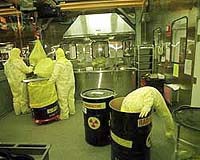 |
Sydney (AFP) Aug 12, 2010 Australia's opposition Thursday vowed to sell uranium to nuclear power India if elected this month and cautioned against over-reliance on China, the country's top trading partner. Foreign Minister Stephen Smith and his conservative, opposition rival Julie Bishop debated foreign policy for the first time ahead of knife-edge August 21 elections, laying out contrasting visions. Smith touted his government's record since taking office in 2007, saying Labor had restored "neglected" ties with the United Nations and key countries in the Pacific, including Papua New Guinea and the Solomon Islands. Australia had withdrawn combat troops from Iraq while maintaining good relations with the United States, which Smith described as "the bedrock of our strategic security and defence arrangements". It had also played a key role in establishing the G20 as the premier international economic institution, which he said was "the most significant achievement of Australian foreign policy since APEC became a leaders' meeting". "This is the century of the Asia-Pacific: economic, strategic, security, military, influence is moving in our direction," Smith said. When prime minister, Kevin Rudd saw China as a key partner and the Mandarin-speaking former diplomat made ties with Beijing a priority of his rule, cut short by a June coup which rudely forced him from office. But Smith said Labor was not "starry-eyed" about relations with China, which were strained by the jailing of a Rio Tinto executive in Shanghai and decision by Australia to grant Uighur dissident Rebiya Kadeer a visa. "There have been tensions in the relationship with China because we do, as different countries and different people, share different values and virtues," he said. Bishop described China as a country fraught with challenges and said some poorer nations in the region were "over-reliant" on Chinese aid, implying they had been forced to open up to Chinese investment in exchange for assistance. But she rejected an official assessment that "conventional warfare with China" was the nation's greatest long-term security threat and said "ongoing military, strategic co-operation with China is essential". Bishop put Japan, the United States and Indonesia at the centre of the Liberal-National coalition's foreign policy, and urged greater engagement with India, Australia's eighth-largest trading partner. "We will reinstate the in-principle decision to sell uranium to India and we will resume a free trade agreement and greater defence co-operation: we are natural maritime partners," she said. Australia has 27 percent of the world's uranium reserves but the centre-left Labor government has said it will be sold only to nations that are signatories to the Nuclear Non-Proliferation Treaty, which does not include India. Bishop claimed that the abilities of Australian troops in Afghanistan had been undervalued and they could have taken the lead role in the restive province of Uruzgan when the Dutch contingent withdrew this month. She left open the question of taking such an offer to US President Barack Obama, saying they would "be always open to a request from the United States to assist in ways that will ensure we are able to succeed in Afghanistan". Smith also stood by Australia's 1,550-troop commitment in Uruzgan and Labor's engagement with President Hamid Karzai government as the "elected government of Afghanistan," despite accusations that it was corrupt. "We are there in Afghanistan and in Uruzgan province because we have to do our bit to stare down international terrorism," Smith said. The foreign minister said Bishop had shown "poor judgment" on a number of issues, including opposing Kadeer's visa and the expulsion of an Israeli envoy over the use of Australian passports in the murder of a top Hamas operative. He also questioned the values of opposition leader Tony Abbott, who he said had outlined a vision for an "Anglosphere where Australia would perform a kind of neighbourhood-watch role" in his bestselling biography. Smith said Labor -- currently leading the election race by the slimmest of margins -- would take a "three-pillar" approach, engaging the US, UN and Asian nations to tackle issues such as climate change, poverty and terrorism.
Share This Article With Planet Earth
Related Links Nuclear Power News - Nuclear Science, Nuclear Technology Powering The World in the 21st Century at Energy-Daily.com
 Federal Investigation Of Texas' Radioactive Waste Dump Urged
Federal Investigation Of Texas' Radioactive Waste Dump UrgedAustin TX (SPX) Aug 12, 2010 Environmental groups have asked the U.S. Nuclear Regulatory Commission (NRC) and the U.S. Environmental Protection Agency (EPA) to investigate the radioactive waste storage and disposal programs administered by the Texas Commission on Environmental Quality (TCEQ) for the West Texas radioactive waste site owned by Waste Control Specialists (WCS). The groups say the TCEQ has failed to protec ... read more |
|
| The content herein, unless otherwise known to be public domain, are Copyright 1995-2010 - SpaceDaily. AFP and UPI Wire Stories are copyright Agence France-Presse and United Press International. ESA Portal Reports are copyright European Space Agency. All NASA sourced material is public domain. Additional copyrights may apply in whole or part to other bona fide parties. Advertising does not imply endorsement,agreement or approval of any opinions, statements or information provided by SpaceDaily on any Web page published or hosted by SpaceDaily. Privacy Statement |